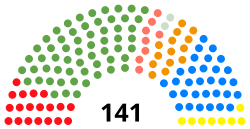Seimas
| Seimas | |
|---|---|
 |
|
| Type | |
| Type | |
| Leadership | |
|
Speaker
|
|
|
First Deputy Speaker
|
|
|
Deputy Speakers
|
|
| Structure | |
| Seats | 141 |
 |
|
|
Political groups
|
Government (76)
Opposition (53)
Non-affiliated (11)
|
| Elections | |
| Parallel voting with a 5% election threshold for proportional seats (7% for coalitions) | |
|
Last election
|
9 and 23 October 2016 |
|
Next election
|
2020 |
| Meeting place | |
 |
|
| Seimas Palace, Vilnius | |
| Website | |
| www |
|
Government (76)
Opposition (53)
Non-affiliated (11)
The Seimas of the Republic of Lithuania (Lithuanian: Lietuvos Respublikos Seimas), or simply the Seimas (pronounced: [sæ̠iˑmɐs]), is the unicameral parliament of Lithuania. The Seimas constitutes the legislative branch of government in Lithuania, enacting laws and amendments to the Constitution, passing the budget, confirming the Prime Minister and the Government and controlling their activities.
Its 141 members are elected for a four-year term, with 71 elected in individual constituencies, and 70 elected in a nationwide vote based on proportional representation. A party must receive at least 5%, and a multi-party union at least 7%, of the national vote to qualify for the proportional representation seats.
Following the elections in 2016, the Lithuanian Peasant and Greens Union is the largest party in the Seimas, forming a ruling coalition with the Social Democratic Party of Lithuania.
The Seimas traces its origins to the Seimas of the Grand Duchy of Lithuania and the Sejm of the Polish-Lithuanian Commonwealth, as well as the Seimas of inter-war Lithuania. The first Seimas after the restoration of independence of Lithuania convened in 1992.
The Seimas of the Republic of Lithuania exercises legislative power in Lithuania. The powers of the Seimas are defined by the Constitution and the laws of Lithuania.
...
Wikipedia
